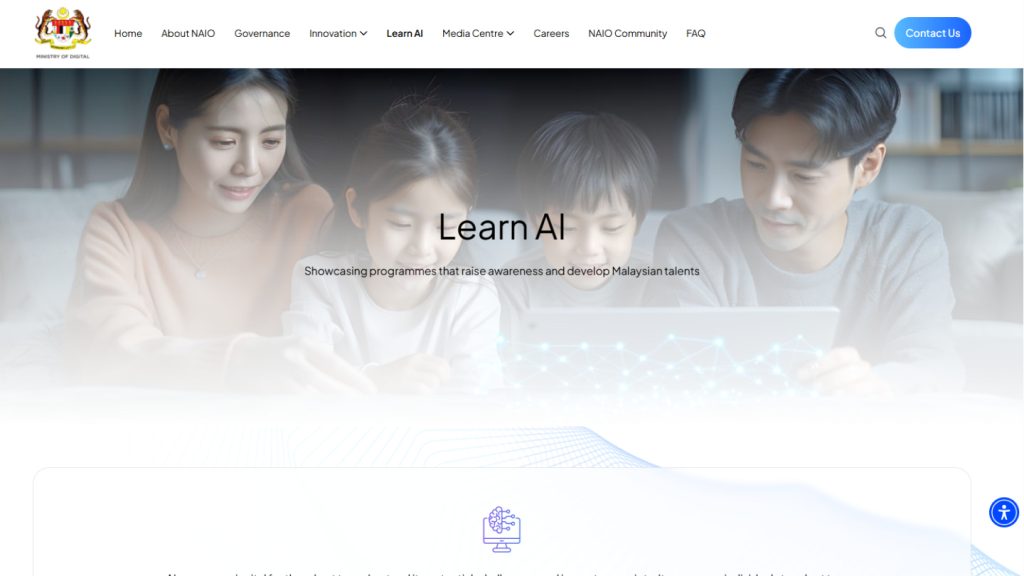Key Takeaway
- AI is transforming industries in Malaysia including finance, healthcare, and manufacturing
- Malaysia offers robust government-backed programs like MyMahir and Rakyat Digital for AI upskilling
- Beginners can follow a structured roadmap from foundational knowledge to specialization
- A mix of formal education and online platforms makes AI learning more accessible than ever
- In-demand AI careers in Malaysia span data science, machine learning, and AI ethics
Table of Contents
ToggleMalaysian Guide to Learning AI
Artificial Intelligence (AI) is no longer a futuristic concept. In Malaysia, AI is already transforming how businesses operate, how governments deliver services, and how individuals interact with technology.
From automating manufacturing lines to powering fintech applications,
AI’s presence is only expanding.
This guide explores everything you need to know about learning AI in Malaysia—from why it matters, to how to start, and where the best opportunities lie. Whether you’re a student, fresh graduate, or mid-career professional, understanding AI could be one of the most valuable skills you develop in 2025 and beyond.
What is AI and Why Is It Important?
AI mimics human intelligence to perform tasks such as reasoning, learning, and decision-making.
At its core, Artificial Intelligence refers to the ability of machines to perform tasks that would normally require human intelligence.
These include learning from experience, recognizing patterns, understanding natural language, and making decisions.
In Malaysia, AI is not limited to research labs or high-tech companies.
It is being applied in agriculture (predictive crop monitoring), logistics (route optimization), banking (fraud detection), healthcare (diagnostics), and government services (AI-enabled chatbots and analytics are being piloted, while most renewals are delivered through standard online systems).
AI’s impact is growing at all levels.
For individuals, it represents an opportunity to future-proof your career. For businesses, it means competitive efficiency. And for Malaysia as a country, it forms a critical part of national digital transformation plans.
Why Learn AI in Malaysia?
Malaysia is strategically investing in AI talent development and creating real career pathways.
National Vision and Policy
The Malaysia Artificial Intelligence Roadmap 2021–2025 outlines strategic goals to transform Malaysia into a regional leader in AI.
Supported by the Ministry of Science, Technology and Innovation (MOSTI), this roadmap focuses on workforce development, ethical AI, and increased adoption across public and private sectors.
Several government agencies and state-led initiatives now offer AI-focused scholarships, certifications, and public training to help citizens prepare for the digital economy.
Economic Demand
Malaysia’s MyDIGITAL target is for the digital economy to contribute 22.6% of GDP by 2025, and estimates suggest it already accounts for about 23% as of 2024—driving demand for AI talent across sectors from healthcare and logistics to finance.
Accessibility to Resources
AI is no longer locked behind expensive university programs.
With a range of online and offline resources—from subsidised government courses to world-class MOOCs—learning AI has become more accessible and affordable for Malaysians of all backgrounds.
Getting Started with AI: A Beginner’s Roadmap
Learning AI doesn’t require a computer science degree. A clear, progressive path makes it manageable for anyone.
Step 1: Understand What AI Really Is
Begin by familiarising yourself with basic AI concepts—what it can do, what it can’t, and how it differs from fields like data science and robotics.
Focus on subfields like machine learning (ML), natural language processing (NLP), and computer vision.
Step 2: Learn Python
Python is the most widely used programming language for AI. Platforms like Codecademy, Coursera, or local training providers offer beginner-friendly Python courses.
Step 3: Strengthen Your Math Basics
You’ll need some understanding of linear algebra, calculus, probability, and statistics. These are the foundations behind most AI algorithms. Focus on applied examples rather than academic theory.
Step 4: Take an Introductory AI Course
Choose beginner-friendly programs that teach the principles of supervised and unsupervised learning, decision trees, neural networks, and data processing. Look for hands-on projects and interactive labs.
Step 5: Pick a Specialisation
Once you understand the basics, you can choose to go deeper into areas like:
- Natural Language Processing (language models, chatbots)
- Computer Vision (image recognition, facial detection)
- AI for Business (forecasting, automation)
Step 6: Build Real Projects
Apply what you’ve learned by building real-world projects.
Start with simple applications like image classifiers or spam detectors. Document your projects on GitHub and write blog posts explaining your process.
Step 7: Join Communities
Learning in isolation is tough. Join AI communities on LinkedIn, local meetups, or Discord groups. Collaborate, get feedback, and stay up-to-date with industry trends.
Government-Led AI Initiatives in Malaysia
Malaysia’s government is actively investing in AI skill-building and digital inclusion.
National programs have been launched to help citizens prepare for AI-based careers, often at little or no cost.
These include national digital literacy movements, reskilling platforms, and targeted training initiatives.
Programs like MyMahir and Rakyat Digital help lower the barrier to entry and ensure inclusive growth in the AI sector.

These initiatives often provide modules in Bahasa Melayu and self-paced learning; some offer certificates or micro-credentials, though employer recognition varies by programme and issuing body.
Top Online Learning Platforms
Online platforms make AI education flexible, affordable, and globally competitive.
International Platforms
- Coursera: Offers AI courses from Stanford, Google, and DeepLearning.ai. Includes hands-on labs and capstone projects.
- edX: Ideal for academic-style learning with professional certificates from institutions like MIT and Harvard.
- Udacity: Known for its Nanodegree programs in AI, often with mentor support and real-world projects.
Local Platforms
- MyMahir: A local platform offering AI and data skills with government collaboration.
- OpenLearning: A Malaysia-based MOOC platform offering AI courses tailored to regional learners.
- AI untuk Rakyat: A public initiative aimed at introducing AI concepts to Malaysians through beginner-friendly modules in Bahasa Melayu.
These platforms suit different learning styles. Some offer structured learning paths and mentorship, while others focus on bite-sized content you can consume on demand.
Formal Education in AI
University programs in Malaysia are adapting to industry needs with AI-specific pathways.
Several public and private universities now offer dedicated undergraduate and postgraduate programs in AI or related fields like data science and robotics. Examples include:
- University of Malaya (UM): Offers AI modules under computer science degrees
- Universiti Teknologi Malaysia (UTM): Offers specialisations in AI and data analytics
- Multimedia University (MMU): Known for its digital and tech-focused curriculum
These programs often include final-year projects, internships, and partnerships with tech companies to ensure graduates are job-ready.
Free vs. Paid AI Resources: What’s Better?
Both free and paid learning resources have distinct advantages. The right choice depends on your goals.
Feature | Free Resources | Paid Resources |
Cost | RM0 | Costs vary widely by provider and subsidy |
Content Quality | Varies; often community-curated | Structured, instructor-led |
Support | Peer forums or none | Mentorship and technical support |
Certification | Rare or non-accredited | Recognised by employers |
For casual learners or those exploring AI for the first time, free resources are an excellent way to get started.
But many public or industry-backed programmes are low-cost or subsidised, while structured nano-degrees or certifications can be higher.
However, if you are committed to a career in AI, paid programs often offer better structure, quality, and industry recognition.
AI Career Landscape in Malaysia
The AI job market in Malaysia is growing, with roles across multiple industries and experience levels.
High-Demand Job Roles
- Machine Learning Engineer: Designs and implements algorithms
- Data Scientist: Extracts insights from large datasets
- AI Researcher: Works on cutting-edge innovation and model development
- NLP Specialist: Focuses on human-language processing
- AI Product Manager: Bridges technical and business teams to build AI-enabled solutions
Required Skills
Employers are looking for candidates with:
- Proficiency in Python, R, SQL
- Experience with frameworks like TensorFlow, PyTorch, or Scikit-learn
- Solid understanding of model training, validation, and deployment
- Knowledge of data ethics and bias mitigation
Industries Hiring AI Talent
- Finance: Credit scoring, fraud detection
- Healthcare: Diagnostics, patient data analytics
- Retail: Demand forecasting, recommendation engines
- Smart Cities: Traffic management, surveillance
As AI continues to integrate into the digital infrastructure, demand for local AI talent is only set to increase.
Start Your AI Journey Today
AI is not just a technical skill—it’s a career advantage, a problem-solving tool, and a key driver in Malaysia’s economic transformation. With the right mix of resources, strategy, and commitment, anyone can learn AI and make it a part of their career path.
Use this guide as your roadmap to build knowledge, gain confidence, and enter the AI field with purpose.
Need help positioning your AI or tech brand for media exposure?
If you’re a startup, edtech platform, or AI company looking to increase visibility, consider working with PRESS—a PR agency focused on tech and innovation. From thought leadership placements to campaign strategy, PRESS helps you tell stories that resonate with both media and your audience.
Disclaimer: All of the content was thoroughly fact-checked and verified by our editorial team to ensure accuracy, clarity, and reliability.
Frequently Asked Questions About Learning AI in Malaysia
What is the easiest way to start learning AI in Malaysia?
Start with beginner-friendly platforms like AI untuk Rakyat or MyMahir. These offer basic modules in Bahasa Melayu with no prior experience required.
Do I need to know programming to learn AI?
Not initially. However, learning Python is strongly recommended as you advance, especially for building AI models and understanding algorithms.
Are AI courses expensive in Malaysia?
There are both free and paid options. Government initiatives offer many subsidised or free courses, while premium platforms like Coursera or Udacity offer more structured, paid programs.
Which university in Malaysia offers the best AI program?
Universities like UM, UTM, and MMU offer strong AI and data science courses. The best one for you depends on the course structure and your goals.
Is AI a good career choice in Malaysia?
Yes. AI roles are in high demand across tech, finance, healthcare, and smart city projects. The skillset is future-proof and globally relevant.
How long does it take to become job-ready in AI?
It depends on your background. With consistent learning and project work, many reach entry-level competence within 6 to 12 months.

